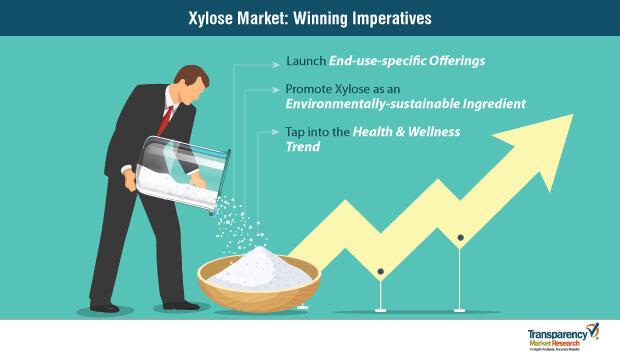5/9/2022
Xylose Market Scope, Competition Strategies, Growth Rate by 2029
3/28/2022
Xylose – A Sweet Solution to Achieve Sugar Reduction
Xylose is one of the most versatile sugars with a wide range of applications as an ingredient in diverse food products to enhance their palatability and organoleptic properties. A paradigm shift in the consumer preference for healthier and natural products has significantly fueled the traction for xylose, particularly in the thriving food and beverage industry, over the recent years. The surging food and beverage industry, coupled with increasing consumer health consciousness, has been pacing up the sales of natural food ingredients, such as plant-derived xylose. This is further indicating a subtle boom in the growth of the xylose market, wherein, companies are exploring product applications in broader industries to gain a stronger hold in the industry.

Xylose Market – The Evolution Map
Xylose was first isolated from woods such as birch in 1881, and has been among the rarer sugars due to its difficult and high-cost preparation. However, in 1930, the United States Bureau of Standards, in a cooperative investigation, found a simple xylose preparation method from cottonseed hull bran, which is a very cheap raw material. This made xylose a sugar obtainable at a price comparable to that of sucrose.
Xylose is now widely found in a large span of woody materials, including straw, corncobs, and pecan shells, and is also known to be found in berries, broccoli, and spinach. Over the years, the use of xylose has grown significantly in food & beverages and pharmaceuticals, to name a few. As per TMR’s analysis, the traction for xylose has grown at a steady pace, with its market anticipated to be valued at ~ US$ 1.5 Bn in 2018. The TMR study indicates a ~ 6% Y-o-Y growth of the xylose market in 2019 over 2018.
Enquiry Before Buying:https://www.transparencymarketresearch.com/sample/sample.php?flag=EB&rep_id=14354
Quest for Sugar Alternatives to Help Fight Diabetes, Uplifting Sales
Growing incidences of type-2 diabetes have led to a notable shift in consumer preference for diabetic sweeteners over conventional sugar, which, in turn, has opened a window of opportunities for market players. Diabetic sweeteners such as xylose aid in maintaining low glycemic index and cholesterol levels, and prevent heart diseases. While white sugar can increase insulin levels in the body, xylitol, a derivative of xylose, has garnered traction as a crystalline aldose sugar that doesn’t impact the same way, and is witnessing wide adoption as a sweetener for tea and coffee.
Natural Approach to Cavity Prevention – A Fast-Growing Trend
Dental hygiene products have emerged as a hotbed of opportunities for xylose manufacturers, in line with the shifting focus of companies towards leveraging natural ingredients in products to appeal a wide pool of health-conscious consumers. Increasing awareness about xylitol’s role in inhibiting the growth of plaque-forming bacteria by preventing tooth decay and oral cavities is creating fresh growth avenues for market players. The adoption of D-xylose-derived xylitol in dental health products is growing substantially, in line with its promising role in preventing the demineralization of enamel and stimulating salivary flow. The growing contribution of xylitol in improving oral health, and curing gum, teeth, and mouth issues, is bolstering its usage in products that combat tooth decay, including mouthwash, toothpaste, and even sugar-free gum.
Get Trending Report-https://www.prnewswire.com/news-releases/hybrid-power-systems-market-is-expected-to-surpass-us-1-bn-by-2031-states-tmr-study-301509149.html
Adoption in Pet Food Upholding Growth
The sales of pet food are growing year-on-year, with pet owners increasingly spending more on their furry family members. Given the fact that pets are often considered as an equal part of the family, consumers have started making similar choices for pet food and animal feed as they do for themselves. This has further led to an increased traction for food with natural, ethically-derived ingredients that come with free-from claims and boast of high nutritional profile. For that matter, xylose is witnessing increased traction as palatability enhancers in altering pet food formats. Although the adoption opportunities for xylose are increasing in the animal feed segment, it is pertinent to note that, there are several concerns around the toxicity and health impact of xylose on some animals. However, there is no substantial scientific literature to prove this impact.
High Traction for Diet-based Foods Underpinning Gains
A large number of consumers have shifted their consumption preferences to healthier products, while creating a significant market for diet-based food products. Responding to this rapidly growing trend, manufacturers in the food and beverage industry have started leveraging healthy ingredients, such as D-xylose derived xylitol that has no carbohydrates, which further makes it a viable choice for diet-based foods. With high fiber content, xylose is likely to garner significant traction as a powerful ingredient that reduces the number of calories, and aids weight loss and digestive health in individuals.
Other articles and publications:
Fumigation Market Forecast to 2025With Growth Rate, Opportunities, Size Analysis
Grain preservatives Market Scope, Competition Strategies, Growth Rate by 2030
8/26/2021
Portable Filtration Systems Market : Scope, Applications and Growth Framework 2027
10/21/2021
Xylose Market Dynamics, Segments and Supply Demand 2019-2029
4/5/2022
Earthmoving Machines Market to Boost Revenue Growth During 2020 – 2029
12/28/2021
Durian Fruit Market : Competitive Strategies, Regional Analysis Forecast 2031
11/15/2021
Articles and publications of other companies:
5 Tips for Creating a Mobile-Friendly Ecommerce Website
8/1/2021
You can forget about waiting on queues to purchase what you've managed to get. Buying clothes online is simple and saves a large amount of time friend of yours who's far from the area of yours.
3/9/2021
Business details
- +1 (518) 618-1030
- State Tower, 90 State Street, Suite 700, Albany NY - 12207, United States
We are the ‘difference’ between success and failure in business. It can’t get simpler than this in explaining what we are. A market research company, our reports and expertise into and outside your bu



